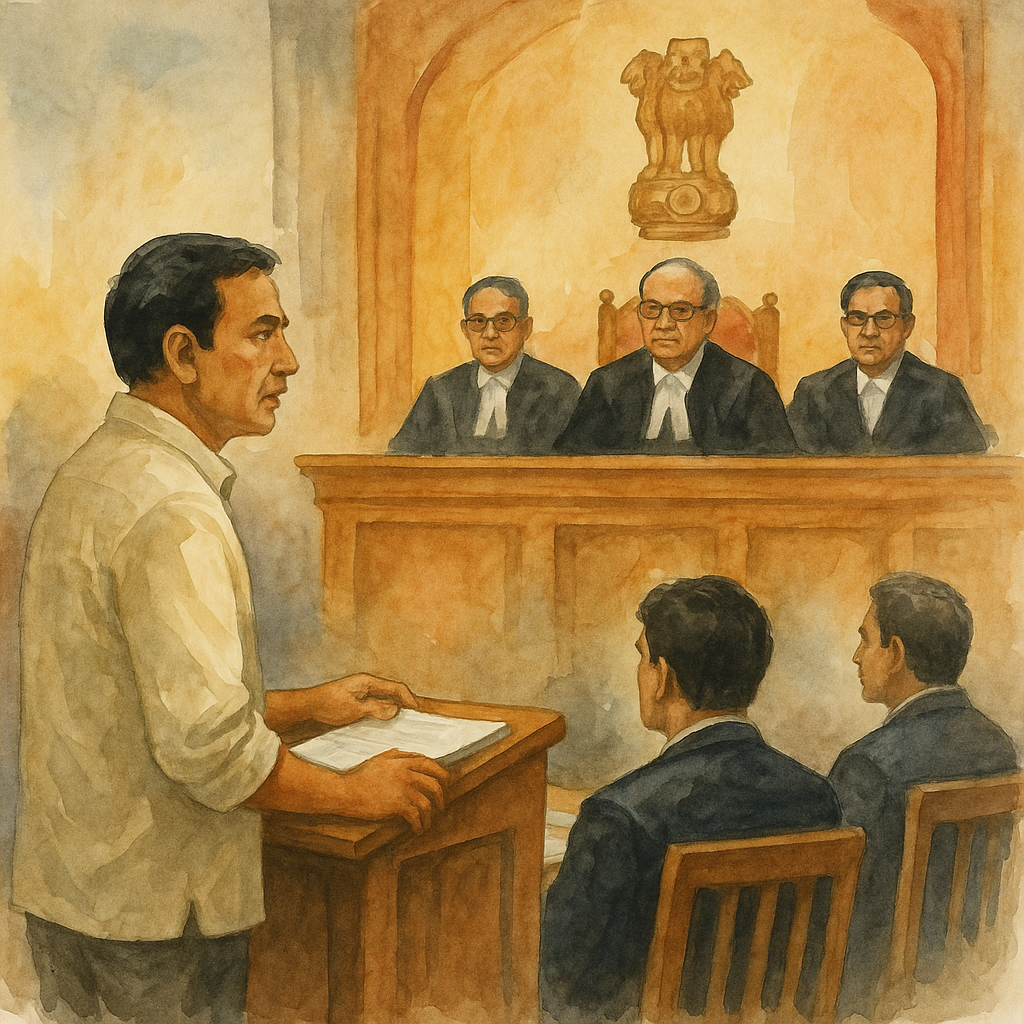Simplified Explanation of the Judgment
The Patna High Court, in a batch of connected writ petitions, dealt with challenges to orders passed under the Central Excise Act, 1944. The petitioners were individuals and business proprietors allegedly involved in large-scale illegal production and trade of cigarettes. Following raids and seizures across Bihar, Jharkhand, and Chhattisgarh, authorities confiscated crores of cigarette sticks and imposed excise duty, penalties, and fines through an adjudication order dated 05.10.2018 and a corrigendum dated 22.11.2018.
The petitioners approached the High Court under Article 226 of the Constitution, seeking to quash the excise orders. They argued mainly that:
- They were denied the right to cross-examine witnesses whose statements were relied upon by the department.
- They suffered financial hardship and could not comply with the mandatory pre-deposit required for filing a statutory appeal.
The Court, however, dismissed the writ petitions for the following reasons:
- Alternative statutory remedy available: The Central Excise Act provides for an appeal and revision process. A writ petition under Article 226 is not maintainable when such statutory remedies exist, except in cases of gross violation of natural justice.
- No total violation of natural justice: Although cross-examination was not allowed, the Court held that prejudice was not shown. The petitioners had not denied the seizure of huge cigarette stocks, nor disputed their involvement in the trade. Therefore, refusal of cross-examination was not fatal.
- Financial hardship not a ground: Inability to pay the pre-deposit for filing an appeal cannot justify bypassing the statutory mechanism.
- Settled law: The Court relied on several Supreme Court decisions, including CIT v. Chhabil Dass Agarwal (2014) 1 SCC 603 and Satyawati Tondon (2010) 8 SCC 110, holding that writ petitions should not be entertained where fiscal statutes provide specific remedies.
Ultimately, while dismissing the petitions, the High Court allowed the petitioners to file statutory appeals within four weeks. It also directed that limitation would not apply if appeals were filed promptly, and the appellate authority should decide them within six months.
Significance or Implication of the Judgment
- For taxpayers and businesses: The ruling makes it clear that challenges to tax and excise orders must follow the statutory appeal route. Writ petitions will not be entertained unless there is a glaring violation of justice.
- For enforcement agencies: The decision supports the principle that seizures and adjudication under fiscal statutes will stand unless overturned through proper appeals.
- For the legal system: It reinforces judicial discipline by ensuring High Courts do not bypass statutory procedures in fiscal matters.
Legal Issue(s) Decided and the Court’s Decision
- Issue 1: Can writ petitions be entertained when an appeal remedy exists under the Central Excise Act?
Decision: No. Writ petitions are not maintainable where alternate statutory remedies are available. - Issue 2: Does denial of cross-examination automatically amount to a breach of natural justice?
Decision: No. The Court held that unless actual prejudice is shown, refusal of cross-examination does not vitiate the order. - Issue 3: Can financial hardship justify avoiding the pre-deposit requirement for appeals?
Decision: No. Financial incapacity is not a valid ground to maintain a writ petition.
Judgments Referred by Parties
- Lakshman Exports Ltd. v. Collector of Central Excise, (2005) 10 SCC 634
- Rajiv Arora v. Union of India, AIR 2009 SC 1100
- Andaman Timber Industries v. CCE Kolkata-II, 2015 (324) ELT 641 (SC)
- Arya Abhushan Bhandar v. Union of India, 2002 (143) ELT 25 (SC)
Judgments Relied Upon or Cited by Court
- Kanungo & Co. v. Collector of Customs, (1973) 2 SCC 438
- Union of India v. Alok Kumar, (2010) 5 SCC 349
- Authorized Officer, State Bank of Travancore v. Mathew K.C., (2018) 3 SCC 85
- CIT v. Chhabil Dass Agarwal, (2014) 1 SCC 603
- Satyawati Tondon v. Union of India, (2010) 8 SCC 110
Case Title
Shri Raj Kumar Gupta @ Raj Kumar Sultania @ Raju Sultania & Others v. Union of India & Others (with connected petitions)
Case Number
Civil Writ Jurisdiction Case No. 4098 of 2019 (with CWJC Nos. 4374/2019, 4541/2019, 4542/2019, 4645/2019, and 8335/2019)
Citation(s)
2021(1) PLJR 655
Coram and Names of Judges
- Hon’ble the Chief Justice Sanjay Karol
- Hon’ble Mr. Justice S. Kumar
Names of Advocates and who they appeared for
- Mr. N.K. Agrawal, Senior Advocate with Mr. Prakash Chandra Agrawal — for the petitioners
- Dr. K.N. Singh, Additional Solicitor General with Mr. Rajesh Kumar Verma, AC to ASG — for the respondents
Link to Judgment
https://patnahighcourt.gov.in/viewjudgment/MTUjNDA5OCMyMDE5IzEjTg==-kYDULpENZKk=
If you found this explanation helpful and wish to stay informed about how legal developments may affect your rights in Bihar, you may consider following Samvida Law Associates for more updates.









